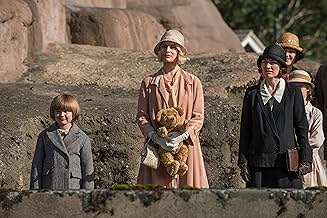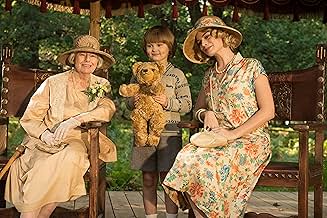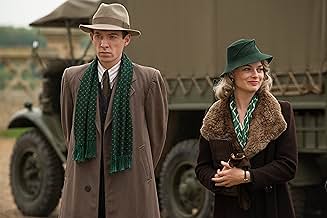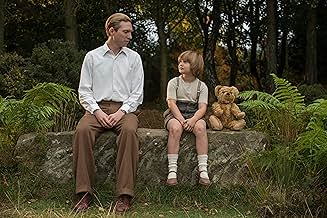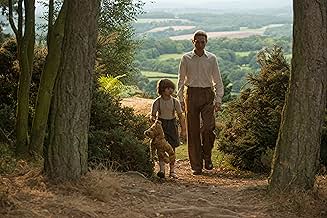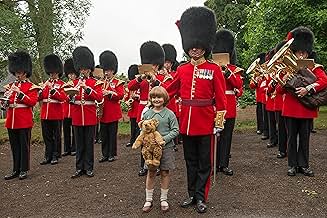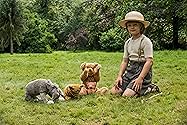VALUTAZIONE IMDb
7,1/10
30.931
LA TUA VALUTAZIONE
Uno sguardo dietro le quinte alla vita dell'autore A.A. Milne e alla creazione delle storie di Winnie the Pooh ispirate a suo figlio C.R. Milne.Uno sguardo dietro le quinte alla vita dell'autore A.A. Milne e alla creazione delle storie di Winnie the Pooh ispirate a suo figlio C.R. Milne.Uno sguardo dietro le quinte alla vita dell'autore A.A. Milne e alla creazione delle storie di Winnie the Pooh ispirate a suo figlio C.R. Milne.
- Regia
- Sceneggiatura
- Star
- Premi
- 2 vittorie e 3 candidature totali
Recensioni in evidenza
This a lovely film focusing on the relationship between A.A Milne and his son, Christopher Robin and how together they became sucked into the world of Winnie the Pooh.
With good performances from all this is a wonderful film, all about lost innocence and the importance of family. We are left with the question about whether Milne really did his son too many favours by placing him in a children's book after all.
Special mention must go to Will Tilston, who plays the young Christopher Robin so beautifully.
I hope this film goes onto wider acclaim, because I thought it was marvellous.
With good performances from all this is a wonderful film, all about lost innocence and the importance of family. We are left with the question about whether Milne really did his son too many favours by placing him in a children's book after all.
Special mention must go to Will Tilston, who plays the young Christopher Robin so beautifully.
I hope this film goes onto wider acclaim, because I thought it was marvellous.
Goodbye Christopher Robin certainly tugged at heartstrings, unfolding a somewhat cold narrative, sprinkled with its share of warm joyous moments of family banter and the creation of something we have all adored for the entirety of our lives. Although only rated PG, it was thematically mature in speaking to the audience as much as the characters spoke to themselves. Its power grew strongest when it beckoned the nostalgia of my childhood, telling a story as astonishingly real as I imagined Winnie the Pooh himself to be—whether it was from the books I read to the show I watched (plus the recent animated film), or my late father playing the Kenny Loggins song on guitar to my delight.
The plot may have moved somewhat slowly, but the flow of the film certainly did not. The pace of the scenes moved very fast, keeping strong engagement throughout. I'll say that it helped I am very familiar with the content material (as we all are), which kind of made it funny when you see the "origin" of a toy animal's name comes from, almost feeling contrived because we already know it... but even if this was a fictional tale with an unfamiliar background you couldn't help but be emotionally riveted. It was well acted all the way around, and we have a breakout performance by the adorable young Will Tilston.
As I said before, this film is not completely sunshine and rainbows. It does play on the idea of "in the darkness comes the light," to shine optimism on our main characters who have dealt with internal conflicts and the pains of the world wars, and to also let viewers leave not too distressed over what could have easily been told as a tale of tragedy. I think most of the right buttons were pressed for myself as I watched it, but I can't say that this is totally a children's movie where they will be riveted with joy and delight (not to mention I don't know how much influence Pooh has on children today compared to that of, say, Dora). Director Simon Curtis did this cool thing when Milne's books were being created that sometimes showed moments between young Christopher Robin and his stuffed bear literally jump off the page. Again, anything that could hearken back to my days 25 years ago were great brownie points for me.
There were only three things I did not much care for about this film. The first is the color timing. Skin tones were muddled in a red-pink hue as the entire palette had desaturated any oranges, and the only green that would appear was on the grass in the woods. Even Margot Robbie's irises lost their vivacity with every closeup of her, occurred was quite often (EDIT: after watching the trailer I see my projector may have been uncalibrated, though it still wasn't my favorite timing). The second was the way PTSD was portrayed, although this is only speaking second-hand. The certain triggers, actions, and overall attachment to the story did not really latch onto the same track as the rest of the film, even if it was authentic. Finally, the timeline jumps would be obtrusive when we have to reestablish where we are at and where we are headed. I want to say it only happened twice, but both times threw me out for a good bit.
There are enough quips in this film to provide moments of laughter, and long-drawn sequences where I notice that I was smiling the entire time. However you may be evoked throughout, by the time the credits roll the only time you couldn't hear others' waterworks was when they were overshadowed by your own. Fantastic film, and if you get a chance you owe it to yourself to see it.
The plot may have moved somewhat slowly, but the flow of the film certainly did not. The pace of the scenes moved very fast, keeping strong engagement throughout. I'll say that it helped I am very familiar with the content material (as we all are), which kind of made it funny when you see the "origin" of a toy animal's name comes from, almost feeling contrived because we already know it... but even if this was a fictional tale with an unfamiliar background you couldn't help but be emotionally riveted. It was well acted all the way around, and we have a breakout performance by the adorable young Will Tilston.
As I said before, this film is not completely sunshine and rainbows. It does play on the idea of "in the darkness comes the light," to shine optimism on our main characters who have dealt with internal conflicts and the pains of the world wars, and to also let viewers leave not too distressed over what could have easily been told as a tale of tragedy. I think most of the right buttons were pressed for myself as I watched it, but I can't say that this is totally a children's movie where they will be riveted with joy and delight (not to mention I don't know how much influence Pooh has on children today compared to that of, say, Dora). Director Simon Curtis did this cool thing when Milne's books were being created that sometimes showed moments between young Christopher Robin and his stuffed bear literally jump off the page. Again, anything that could hearken back to my days 25 years ago were great brownie points for me.
There were only three things I did not much care for about this film. The first is the color timing. Skin tones were muddled in a red-pink hue as the entire palette had desaturated any oranges, and the only green that would appear was on the grass in the woods. Even Margot Robbie's irises lost their vivacity with every closeup of her, occurred was quite often (EDIT: after watching the trailer I see my projector may have been uncalibrated, though it still wasn't my favorite timing). The second was the way PTSD was portrayed, although this is only speaking second-hand. The certain triggers, actions, and overall attachment to the story did not really latch onto the same track as the rest of the film, even if it was authentic. Finally, the timeline jumps would be obtrusive when we have to reestablish where we are at and where we are headed. I want to say it only happened twice, but both times threw me out for a good bit.
There are enough quips in this film to provide moments of laughter, and long-drawn sequences where I notice that I was smiling the entire time. However you may be evoked throughout, by the time the credits roll the only time you couldn't hear others' waterworks was when they were overshadowed by your own. Fantastic film, and if you get a chance you owe it to yourself to see it.
Goodbye Christopher Robin is in many ways a missed opportunity. It appears that if this film was rewritten and redirected it could have been an exceptional film. It had the elements of a great gripping story and an origin story to one of the most beloved children's stories of all time. This film presented a unique perspective, background and aftermath surround Winnie the Pooh. Too much attention was placed on Christopher's childhood and development of the story and far less on its aftermath which based on the title seemed to be the point of the story. More time could have been devoted to Christopher's adolescence and Christopher himself rather than the creative process and post war trauma faced by A A Milne. The film takes its time in building itself up only to rush towards its climax. It was passable but not exceptional and it very well could have been.
The thought of a biopic that charts the touching story of the creation of a children's tale that has meant so much to so many over the years instantly makes me think of Finding Neverland, a sweet film I'm very fond of. In many ways, Goodbye Christopher Robin is very similar – bitter-sweet, heart-warming, full of nostalgia; you could easily swap Johnny Depp for Domhnall Gleeson and Kate Winslet for Margot Robbie (although the characters differ greatly). Although this story behind Winnie the Pooh doesn't contain quite the same childish magic and glee that the story behind Peter Pan gave us, it's still a delightful, emotional story told in a joyful, touching way.
The film as a whole addresses several themes and it's really a bit of a mishmash – it's not just about the creation of the Winnie the Pooh books; it's about the impact of war, the troubles with early 20th century parenting, tricky father-son relationships, the joy and innocence of childhood, and the pain and price of fame. This all works as both a strength and a weakness of the film; in many ways it's wonderful to have such a wealth of topics and the variety keeps things fresh and interesting. On the other hand, some themes aren't fully explored to the extent they could be and it feels as though it's missing something occasionally. It never really focuses on one theme and so does tend to meander around all these topics, telling a vague story; at times it seems to be more a series of scenes with just a semblance of story. Of course this is because the story itself is fairly simple, so it's nice that they enriched the plot with so many themes; it just feels as though it could have benefited from a little more detail.
Nevertheless it's a film that's a joy to watch and brings with it a load of emotions – sniffles and tears seemed to permeate the cinema. This is down to a couple of things; firstly the characters and the story they go through together; but more than that all the references (some obvious, some subtle) to Winnie the Pooh and the rest of Milne's work. From small quotations and images, to creating a little wooden hut to house one of Billy's toys, there are plenty of nods to Winnie the Pooh and these can't fail to bring a nostalgic tear to anyone and awaken fond childhood memories. The childhood especially is heavily romanticised and anyone can identify with Billy Moon in some way, bringing to mind all the happiness and innocence we experienced as children. This is all complimented by beautiful cinematography, making the wilds of Ashdown Forest seem absolutely stunning and really strengthening the magical quality of childhood and its inexhaustible supply of imagination and charm. In fact it's this middle section where the world of Winnie the Pooh is created that is the strongest part.
There aren't a great many characters in this film, making it all seem more intimate, allowing us to grow attached to the characters – though at times this can be challenging. As excellent as Gleeson is, it can be sometimes difficult to understand and empathise with him as his character is so stiff and reserved; still Gleeson gives us a wonderful contrast to this and how time with his son helps him to loosen up and re-discover his 'inner child'. Margot Robbie's Daphne comes across as a missed opportunity. Stunning and beautiful as always, it's hard to imagine Robbie playing a detestable character, but this she manages to do and do well. It's just the writing doesn't really seem to do her credit as we aren't given a real insight into her character. Kelly Macdonald and Will Tilston do shine though. Macdonald's Olive grounds the film as the friendliest, least complex adult character and Tilston exceeds all expectations you would have from a nine year old in their first ever acting role. Sheer innocence and childishness emanates effortlessly from his big eyes and little movements. He really is the heart of the film and fortunately they make the most of him. Sadly every boy has to grow up, but Billy Moon's 18 year old self played by Alex Lawther fills the shoes of his younger counterpart well, giving us the necessary angst and emotion needed.
Perhaps not quite the early Oscar contender I hoped for and it lacks some of the magic that I loved in similar film Finding Neverland. However, this is still a great film, dripping with emotion, nostalgia and a romantic view of childhood; exploring a wealth of themes and with some excellent performances (particularly from the titular Christopher Robin) and affectionate references to a childhood classic, Goodbye Christopher Robin is a lovely, bittersweet film for the whole family. Bring the tissues – this one's going to move you.
The film as a whole addresses several themes and it's really a bit of a mishmash – it's not just about the creation of the Winnie the Pooh books; it's about the impact of war, the troubles with early 20th century parenting, tricky father-son relationships, the joy and innocence of childhood, and the pain and price of fame. This all works as both a strength and a weakness of the film; in many ways it's wonderful to have such a wealth of topics and the variety keeps things fresh and interesting. On the other hand, some themes aren't fully explored to the extent they could be and it feels as though it's missing something occasionally. It never really focuses on one theme and so does tend to meander around all these topics, telling a vague story; at times it seems to be more a series of scenes with just a semblance of story. Of course this is because the story itself is fairly simple, so it's nice that they enriched the plot with so many themes; it just feels as though it could have benefited from a little more detail.
Nevertheless it's a film that's a joy to watch and brings with it a load of emotions – sniffles and tears seemed to permeate the cinema. This is down to a couple of things; firstly the characters and the story they go through together; but more than that all the references (some obvious, some subtle) to Winnie the Pooh and the rest of Milne's work. From small quotations and images, to creating a little wooden hut to house one of Billy's toys, there are plenty of nods to Winnie the Pooh and these can't fail to bring a nostalgic tear to anyone and awaken fond childhood memories. The childhood especially is heavily romanticised and anyone can identify with Billy Moon in some way, bringing to mind all the happiness and innocence we experienced as children. This is all complimented by beautiful cinematography, making the wilds of Ashdown Forest seem absolutely stunning and really strengthening the magical quality of childhood and its inexhaustible supply of imagination and charm. In fact it's this middle section where the world of Winnie the Pooh is created that is the strongest part.
There aren't a great many characters in this film, making it all seem more intimate, allowing us to grow attached to the characters – though at times this can be challenging. As excellent as Gleeson is, it can be sometimes difficult to understand and empathise with him as his character is so stiff and reserved; still Gleeson gives us a wonderful contrast to this and how time with his son helps him to loosen up and re-discover his 'inner child'. Margot Robbie's Daphne comes across as a missed opportunity. Stunning and beautiful as always, it's hard to imagine Robbie playing a detestable character, but this she manages to do and do well. It's just the writing doesn't really seem to do her credit as we aren't given a real insight into her character. Kelly Macdonald and Will Tilston do shine though. Macdonald's Olive grounds the film as the friendliest, least complex adult character and Tilston exceeds all expectations you would have from a nine year old in their first ever acting role. Sheer innocence and childishness emanates effortlessly from his big eyes and little movements. He really is the heart of the film and fortunately they make the most of him. Sadly every boy has to grow up, but Billy Moon's 18 year old self played by Alex Lawther fills the shoes of his younger counterpart well, giving us the necessary angst and emotion needed.
Perhaps not quite the early Oscar contender I hoped for and it lacks some of the magic that I loved in similar film Finding Neverland. However, this is still a great film, dripping with emotion, nostalgia and a romantic view of childhood; exploring a wealth of themes and with some excellent performances (particularly from the titular Christopher Robin) and affectionate references to a childhood classic, Goodbye Christopher Robin is a lovely, bittersweet film for the whole family. Bring the tissues – this one's going to move you.
Not having any serious connection with Pooh, Tigger, Piglet and the rest of the children's story, Winnie the Pooh, I am perhaps even more ready than its devotees to admire Goodbye Christopher Robin. It's a biopic of great sensitivity that mixes nostalgia for the most popular children's book ever with the harshness of two world wars and the practice of parents leaving their children with nannies in the first quarter of the 20th century.
I now wish I had a stronger relationship with those little critters and that lovable boy, for I could have used the distraction from the aftermath of WWII just as Pooh was able to do for the world after the war to end all wars. Author A.A. Milne (a stoic and yet lovable Domhnall Gleeson) was traumatized by his service in the war, and moved slowly to erase that PTSD while creating Pooh. The film spends too much time on his trauma, but it does help fill out Milne's character.
Yet, this is the story of Billy Moon (a remarkably-dimpled, serene Will Tilston), as Christopher Robin is called in real life, who supplies his dad with inspirations for the book. The film centers on remote dad's growing love for the boy and the book while remote mom goes off to London to do who knows what. The film carefully shows how children might be lucky to have a nanny like Neu (Kelly Macdonald) to give them love and some creative inspiration along the way.
Goodbye Christopher Robin is a successful biopic because it doesn't spare the story of anti-helicopter parents who endanger the mental health of their children with their absences. As fame overtakes the Milne family, the film still relays the sense of wonderment Billy had as a child immersed in love of his forest, animals, and imagination.
The biopic may be counter to what we expected of a world-renowned author of a book for children. That he had difficulty initially interacting with his own child is unusual, but the film is successful showing how he warms up and creates a masterpiece as well.
Though not always a feel good movie, Goodbye Christopher Robin makes you wish he'd never go away. It looks like he never will.
I now wish I had a stronger relationship with those little critters and that lovable boy, for I could have used the distraction from the aftermath of WWII just as Pooh was able to do for the world after the war to end all wars. Author A.A. Milne (a stoic and yet lovable Domhnall Gleeson) was traumatized by his service in the war, and moved slowly to erase that PTSD while creating Pooh. The film spends too much time on his trauma, but it does help fill out Milne's character.
Yet, this is the story of Billy Moon (a remarkably-dimpled, serene Will Tilston), as Christopher Robin is called in real life, who supplies his dad with inspirations for the book. The film centers on remote dad's growing love for the boy and the book while remote mom goes off to London to do who knows what. The film carefully shows how children might be lucky to have a nanny like Neu (Kelly Macdonald) to give them love and some creative inspiration along the way.
Goodbye Christopher Robin is a successful biopic because it doesn't spare the story of anti-helicopter parents who endanger the mental health of their children with their absences. As fame overtakes the Milne family, the film still relays the sense of wonderment Billy had as a child immersed in love of his forest, animals, and imagination.
The biopic may be counter to what we expected of a world-renowned author of a book for children. That he had difficulty initially interacting with his own child is unusual, but the film is successful showing how he warms up and creates a masterpiece as well.
Though not always a feel good movie, Goodbye Christopher Robin makes you wish he'd never go away. It looks like he never will.
Lo sapevi?
- QuizThe film's depiction of C.R. Milne's relationship with his parents is relatively accurate. The actual C.R. never forgave his father for exploiting him (perhaps inadvertently) to sell books. Instead, he learned to accept what had happened and lived with it until he died in 1996. His relationship with his mother was worse; she disapproved of C.R. marrying his cousin. After A.A. Milne died in 1956, C.R. had almost no contact with his mother until she died fifteen years later. C.R.'s only child, his daughter Claire, was born with cerebral palsy. She died in 2012 at age 56.
- BlooperWhen the Guards band are playing, several are wearing modern day medals (Iraq, Afghanistan etc.). The close up of the cymbal player shows the Queen's Golden and Diamond Jubilee Medal which weren't awarded till 2002 and 2012, alongside a LSGC with Queen Elizabeth II on it.
- Citazioni
Daphne Milne: You know what writing a book against war is like? It's like writing a book against Wednesdays. Wednesdays... are a fact of life, and if you don't like them, you could just stay in bed, but you can't stop them because Wednesdays are coming and if today isn't actually a Wednesday it soon will be.
- ConnessioniFeatured in Box Office: Episodio datato 28 settembre 2017 (2017)
- Colonne sonore2 Waltzes, Op. 54: Waltz No. 1: Moderato in A Major
Written by Antonín Dvorák
Performed by Vlach Quartet Prague
Courtesy of Naxos Rights US Inc.
I più visti
Accedi per valutare e creare un elenco di titoli salvati per ottenere consigli personalizzati
- How long is Goodbye Christopher Robin?Powered by Alexa
Dettagli
- Data di uscita
- Paesi di origine
- Siti ufficiali
- Lingua
- Celebre anche come
- Hasta pronto, Christopher Robin
- Luoghi delle riprese
- Aziende produttrici
- Vedi altri crediti dell’azienda su IMDbPro
Botteghino
- Lordo Stati Uniti e Canada
- 1.735.251 USD
- Fine settimana di apertura Stati Uniti e Canada
- 57.917 USD
- 15 ott 2017
- Lordo in tutto il mondo
- 7.401.949 USD
- Tempo di esecuzione1 ora 47 minuti
- Colore
- Mix di suoni
- Proporzioni
- 1.85 : 1
Contribuisci a questa pagina
Suggerisci una modifica o aggiungi i contenuti mancanti

Divario superiore
What is the streaming release date of Vi presento Christopher Robin (2017) in Brazil?
Rispondi






